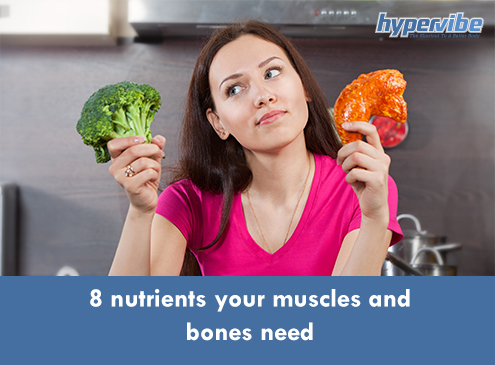
Maintaining healthy bones and muscles is vital not only for your physical appearance but for your overall health as well, as weak muscles and bones make you prone to falls and fractures, and prevent you from engaging in physical activities, thus depriving you from numerous health benefits.
Exercising daily and eating a variety of foods that provide minerals and vitamins are the simplest and most accessible strategies for protecting your locomotory system and enhancing its health. Given below are some of the nutrients you should always include in your diet in order to maintain strong bones and muscles.
The most important mineral for your bones, calcium plays a variety of roles inside the human body, from keeping your bones strong to regulating the secretion of hormones, maintaining the blood pressure within normal limits, or ensuring the healthy nerve signaling and muscle function. Without enough calcium your bone density may drop and your bones may become weak, brittle and easily broken. Risk of fractures increases in this situation, and you may also develop spine deformities, or conditions like osteoporosis.
Good sources of calcium include yogurt, milk and cheese, spinach and other green leafy veggies, as well as enriched breakfast cereals. But don’t forget that along with calcium you also need vitamin D, as this nutrient helps the body absorb calcium, so let’s see what other things does this mineral for the human body.
Keep in mind that the daily recommended dose for adults aged 50 and above is 1,200 milligrams of calcium, while adults aged under 50 years are advised to consume 1,000 milligrams of this mineral per day.
Besides contributing to strong muscles and bones, vitamin D also helps in maintaining the proper immunity level, blocks the release of some hormones and may be involved in reducing the risk of colon, breast and prostate cancers. Some research links vitamin D with the prevention of diabetes, heart disease, multiple sclerosis and hypertension.
With an adequate amount of vitamin D, you can help your body maintain or normalize the mineralization of bones, reducing the risk of fractures. Adults need 200 international units (IUs) of this vitamin per day, but those aged 50 and above should get between 400 and 600 UIs of vitamin D per day.
You can get this nutrient from fatty fish, like salmon, mackerel and tuna, but also from fish liver oil, yogurt – especially fortified products, milk, as well as some cereals and fortified orange juice. Shrimp, sardine and egg yolks are also good sources of this mineral. Additionally, you can stimulate the production of vitamin D inside your body by exposing yourself to sunlight on a daily basis.
Less known that vitamin D, vitamin K is also essential for strong bones and muscles, as it helps in the production of proteins that are required for healthy bones. It is also involved in the blood clotting process, and seems to reduce the amount of calcium excreted by the body, preventing the demineralization of bones and muscle cramps. Good sources of kale include green vegetables like spinach, Swiss chard, broccoli or kale.
Just like vitamin K and D, vitamin C is involved in maintaining the health of the musculoskeletal system, helping the body keep its muscles, joints and bones strong. Vitamin C stimulates the production of collagen, which prevents bones from becoming brittle, strengthens the tendons, stabilizes the joints and keeps the muscles flexible.
Women need 75 milligrams of this micronutrient and men should get 90 milligrams of vitamin C on a daily basis. Good sources include citrus fruits, strawberries, red peppers, kiwi fruits, oranges and other fruits.
To keep inflammatory processes away and prevent the swelling of joints, as well as for reducing the risk of osteoarthritis and minimizing joint and muscle pain, omega-3 fatty acids should be part of your diet. Studies suggest that omega-3 fatty acids taken from fish or fish oil may improve insulin sensitivity, preventing muscle breakdown, and may help in enhancing the effects of strength training, thus favoring the growth and strengthening of muscles.
Moreover, these nutrients may reduce joint pain and improve fat metabolism, thus provide energy for your workouts. Omega-3 fatty acids can be taken from flaxseeds, walnuts, salmon, sardines, tuna, herring and mackerel, eggs, milk, yogurt, peanut butter, oatmeal, pumpkin seeds and cereals.
The lack of magnesium from your diet can lead to fatigue, nausea and loss of appetite, muscle weakness, numbness and tingling, as well as cramps and abnormal heart rhythm. The body’s magnesium absorption capacity decreases with age, so you should pay attention and include more sources of this mineral in your menu.
Foods rich in magnesium include nuts and seeds, fish, unrefined grains, green veggies and legumes, as well as almonds, peanuts and cashews, beef and chicken breast, oatmeal, salmon, bananas, rice, kidney beans and potatoes.
Potassium helps nerves and muscles communicate, so it’s also involved in the health of your locomotory system. It neutralizes acids that remove calcium from the body, and this prevents the demineralization of bones; in postmenopausal women an adequate intake of calcium may improve bone health. Potassium deficiency may cause muscle weakness, cramps, spasms and tension.
Foods rich in this mineral include sweet potatoes, winter squash, white beans, yogurt, halibut, bananas, broccoli, milk, lentils, pork tenderloin, raisins, pistachios, salmon and tuna.
Zinc is needed for maintaining the proper mineralization of bones and for ensuring their healthy renewal. People with zinc deficiency are more likely to have a poor bone status and are more prone to impaired growth. Sources of zinc include red meat, poultry, legumes and whole grain cereals.
Have something to add to this article? Comment below or join our Facebook community and share your thoughts with us!

The lymphatic system plays a crucial role in your bodily...

Simply put, your muscles contract and relax in response to...

If you keep hearing more about the vibration plate lately,...

If you are suffering from back pain or lower back...

Whole body vibration exercises may not seem the safest choice...